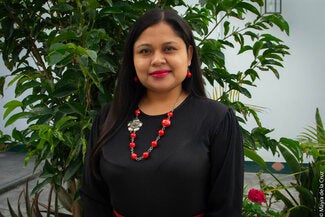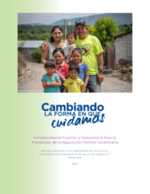
Background Information
I am a lawyer by training. I have a degree in Academic degree in Law and Political Science from the Cesar Vallejo University, Trujillo – Peru. It includes studies in Child Sexual Abuse, Family Law, Comprehensive Care and Prevention of Family Violence, among others. I am also a certified coach in Executive Coaching Process, trained in coaching by LIDERA and certified in Political Innovation and Leadership with a Gender Approach.
In 2019, I participated in the 4th Congress of the Latin American Network of Protection Graduates in the Human Rights Commission of Mexico and in the first National Meeting of Graduates of the Protection System of Peru. I also participated in the National Dialogue "The alternative care of children and adolescents in Peru" and the "Latin American and Caribbean Meeting of Networks and Organizations of Children and Adolescents.”
In 2021, I received a Freedom Woman Award in merit of the outstanding activity in the performance of social work in Cambiando Horizontes (“Changing Horizons”), within the framework of International Women's Day and presented by the Development and Inclusion Management of the Regional Government and the Network of Women Authorities in Freedom.
My jobs have included being the Assistant Director in a residential center called “Center Hogar de Esperanza,” where I had responsibility for administrative and legal activities, as well as running workshops with the children. As the Director of the Preparation Program for Independent Living at “Casa Hogar Luz de Vida,” I worked with adolescents to prepare for their independent life after care. Later working as the Director of the Personal Autonomy Programme for adolescents at “La Libertad Center.” Since 2021 I have been the Executive Director of Cambiando Horizontes (“Changing Horizons”).
Our Interview With Practitioner
I continue to learn through leadership courses and coaching training, as well as specific training to acquire new skills that help my professional development. The training from Changing the Way We Care Guatemala has helped me understand more about care reform. Visiting Guatemala in exchange and to learn and observe was really helpful. I participate in the Transforming Children's Care Global Collaborative Platform, Spanish-language group – which is a great opportunity for learning. I am in a virtual Lifeline course and in networks where experiences are shared, for example the ReLatam Network. This year I will begin a master's degree in Family, Childhood and Adolescence Law.
Know how to respect the individuality of each child and young person; their customs and beliefs. For example, we give workshops according to the needs of each and we work the life plan in a personalized way because each child has their own goals, history and problems.
Open spaces where the young person can be the one who makes decisions for their daily life and for their care options.
That families deserve opportunities focused on their strengths more than their weaknesses. Through a combination of love, responsibility and training, we can expand and enrich the opportunities and services we offer.
My Diploma work in Family Law, Children and Sexual Abuse and coursework on Trauma Competent Care.
Strategic planning tools and program work plan tools which help detail activities and weekly objectives and indicators tracking.
Changing the Way We Care Case Management virtual trainings.
I am motivated by my faith and service. As a child I was impressed to hear James 1:27 in my church. True pure religion is to visit orphans and widows in their tribulations and Psalm 82:3 we must plead the cause of the orphan and the helpless; the poor and the oppressed by doing them justice. I grew up fulfilling this call from God to offer love, help to the forgotten and abandoned in society. I see that every time we serve the most vulnerable, we give a true and practical picture of what we teach in the church. That is why since childhood I have served and actively serve in various social projects of my parish teaching children in bonding, Sunday Schools, summer camps.
During my pre-professional studies, I volunteered in a local residential center for several summers months. This experience confirmed first my life purpose to serve vulnerable populations and second showed me that many children and young people are defenseless and labeled by our society. This motivates me to be a voice for those who do not have the full protection of their Human Rights.
After finishing my studies, I spent time working as an Assistant Director in a Residential Reception Center, developing administrative and legal activities, participating in adoption processes and also providing workshops. After seeing the need that the young people who graduated did not have tools for their graduation. I started doing workshops and accompaniment for their independent life after their departure from the care system. Given these experiences and seeing the needs and with the desire to propose new service alternatives in my region with my husband we founded the organization Cambiando Horizontes (“Changing Horizons”) and part of our main objectives was that fewer children go to residential centers.
Work in networks. We connect with other institutions in order to work in collaboration around services and resources.
- Strengthen families: Managing to carry out workshops to strengthen their decision-making skills, good practices to improve parenting and strengthen ties in the family environment.
- Accompaniment and Mentoring: Having trained mentors who will accompany children and young people during the process of growth and learning.
- Sensitizing faith communities so that they can engage and support more vulnerable children and families in the community.
- Training the staff of the residential care centers to better care
- Connecting young people with their families, making visits to their family, knowing their context and individual situations
- Provide psychology services.
- Follow-up of cases of care leavers and children who are reintegrating into their families
- Promote transition from residential care services to family-based and community services
Where They Operate
Key Areas of Work
Languages Spoken
Practitioner Resources
Este documento se basa en la experiencia de Cambiando la Forma en Que Cuidamos (o sus siglas en inglés, CTWWC) Guatemala en procesos de fortalecimiento familiar y comunitario en un área específica de intervención.

